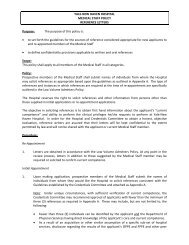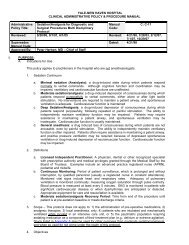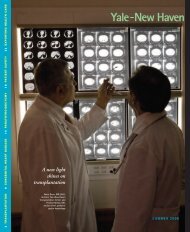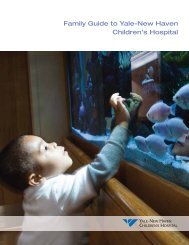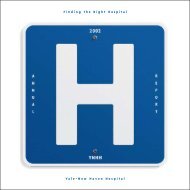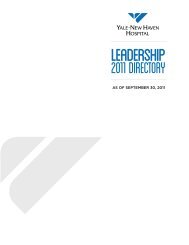Medical Staff Education Reading Materials - Yale-New Haven Hospital
Medical Staff Education Reading Materials - Yale-New Haven Hospital
Medical Staff Education Reading Materials - Yale-New Haven Hospital
You also want an ePaper? Increase the reach of your titles
YUMPU automatically turns print PDFs into web optimized ePapers that Google loves.
Healthcare Associated Infections<br />
and the Prevention and Control of<br />
Multi-Drug Resistant Organisms<br />
(MDRO)<br />
Introduction<br />
• HAIs are more likely to be caused by multi-drug resistant<br />
organisms (MDRO) than community acquired infections.<br />
MDROs are bacteria resistant to first line therapies.<br />
MDROs are often difficult to treat due to their innate or<br />
acquired resistance to multiple classes of antimicrobial<br />
agents.<br />
In some cases, there are few, if any, options for<br />
patient treatment.<br />
Examples of MDROs:<br />
Vancomycin resistant enterococcus (VRE)<br />
Methicillin resistant Staphylococcus aureus (MRSA)<br />
Gram negative bacteria (e.g., E. coli, Pseudomonas,<br />
Klebsiella, Enterobacter, Acinetobacter) resistant to<br />
first line antibiotic agents and/or carrying certain<br />
resistance traits (e.g., ESBL = extended spectrum<br />
beta-lactamase, KPC = Klebsiella pneumoniae<br />
carbepenemase)<br />
The Chain of Transmission<br />
HAIs don’t occur spontaneously. They are the result<br />
of a number of steps in a process that allows an<br />
organism to colonize and/or infect a susceptible<br />
host.<br />
These steps are linked and are commonly referred<br />
to as the “Chain of Transmission”.<br />
The transmission of infectious agents requires three<br />
elements:<br />
1. A source (or reservoir) of infectious organisms<br />
2. A susceptible host with a portal of entry for the<br />
organism<br />
3. A mode of transmission for the organism<br />
Siegel JD, Rhinehart E, Jackson M, Chiarello L, and the Healthcare Infection Control Practices Advisory<br />
Committee, 2007 Guideline for Isolation Precautions: Preventing Transmission of Infectious Agents in<br />
Healthcare Settings , http://www.cdc.gov/ncidod/dhqp/pdf/isolation2007.pdf<br />
Introduction<br />
• The CDC estimates that healthcare-associated infections<br />
(HAI) account for an estimated 1.7 million infections and<br />
99,000 associated deaths each year in the US.<br />
Cost: $17 - 29 billion a year.<br />
One of the top ten leading causes of death.<br />
• HAIs are infections that patients acquire during the course of<br />
receiving treatment for other conditions within a healthcare<br />
setting.<br />
HAIs are not present or incubating at the time of admission.<br />
HAIs lead to:<br />
increased length of stay<br />
more diagnostic tests<br />
more treatment<br />
more antibiotics<br />
more antibiotic resistance<br />
Introduction<br />
• MDRO infections are particularly difficult and<br />
problematic to treat in certain patient populations<br />
such as:<br />
Immunosuppression<br />
Prosthetic devices<br />
Device related infections (e.g., central line infection,<br />
Foley catheter related infection, ventilator associated<br />
pneumonia)<br />
• Although C. difficile (C. diff) is not technically an<br />
MDRO, it poses similar challenges for prevention<br />
of transmission and treatment.<br />
Outbreaks of a particularly virulent strain of C. diff are<br />
being increasingly reported in the US.<br />
The Chain of Transmission<br />
• A Source<br />
Where the organism resides<br />
(patients, healthcare<br />
workers, visitors,<br />
environment, equipment).<br />
• Means (modes) of Transportation<br />
How the organism is picked up and<br />
taken to the host (contact,<br />
airborne, droplet).<br />
• A Susceptible Host<br />
A person who is capable of<br />
receiving the organism and<br />
playing host to the organism.


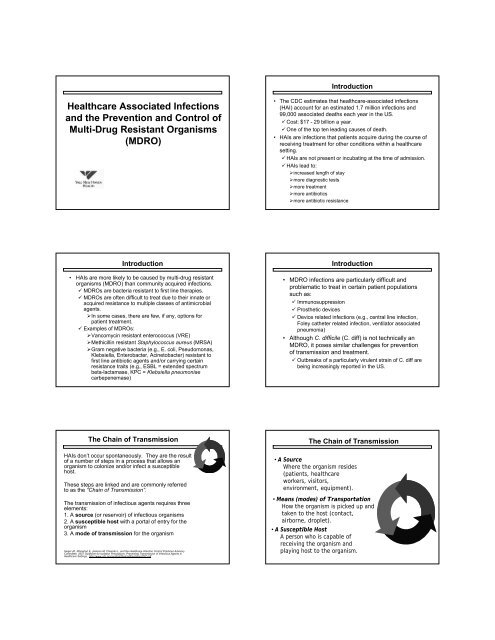
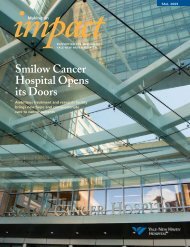

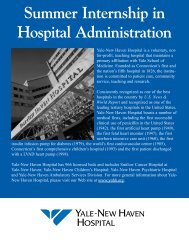
![Annual Report Donor Listings [pdf] - Yale-New Haven Hospital](https://img.yumpu.com/49673575/1/190x245/annual-report-donor-listings-pdf-yale-new-haven-hospital.jpg?quality=85)

